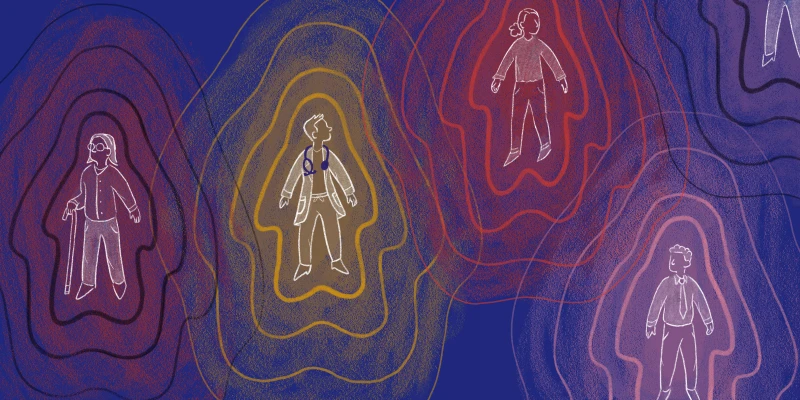 I could feel their eyes on me, pleading for me to give them the news that they wanted to hear, that their baby was fine. As I looked at the ultrasound image of the perfectly-formed 38-week fetus, all I could hear were the words in my head. I could not bear to look them in the eyes. I kept hoping that if I continued going over and over the area of the chest, where the baby’s beating heart should be, that they would see, that I wouldn’t have to be the one to tell them.
I could feel their eyes on me, pleading for me to give them the news that they wanted to hear, that their baby was fine. As I looked at the ultrasound image of the perfectly-formed 38-week fetus, all I could hear were the words in my head. I could not bear to look them in the eyes. I kept hoping that if I continued going over and over the area of the chest, where the baby’s beating heart should be, that they would see, that I wouldn’t have to be the one to tell them.
How could I possibly tell them? I was a resident. I was not their obstetrician. How could I tell them that their baby was dead?
It started as any call night usually did. The daytime resident team would sign out to me, the second-year OB resident doing the “night float” rotation, a brutal month-long stint of 8 p.m. to 8 a.m. shifts. As the “night float,” I was in charge of managing and delivering all the patients that came through Labor and Delivery. Yes, there was a chief resident, and there was an attending, but it was almost verboten to wake them up. You had better have a really good reason.
The kind of calls that came into the Labor unit at night varied from the usual labor calls, to the false labor calls, to the preterm labor calls (almost always after midnight and after sex), to bleeding, and to the usually mundane “decreased fetal movement” complaints. This particular couple presented with the decreased fetal movement complaint.
In most cases, the nurse will get the patient into a triage bed, put on the fetal monitor, and find a nice strong heartbeat. In most cases, a 20-minute tracing will show a fine fetal heart rate pattern, and everyone is happy. But on this night, the nurse could not find a heartbeat, which is why she called the “doctor” (that would be me). Still bright-eyed, as it was still early in my shift, I was not worried when I walked in the room; sometimes the baby has shifted positions, making it difficult for the nurse to locate the fetal heartbeat. I tried to put the couple at ease as I stared at the ultrasound.
But my mind started racing. Where is the heartbeat? Oh my god, there’s no heartbeat. What am I going to say? Can’t they see what I’m seeing? The nurse can see it, right? Can’t she help me out here? How am I going to break this to them? Who is the attending on call? Can I get out of this? No, you have to tell them. I continued to stare at the screen without saying anything.
Finally, after what seemed like an eternity, I pointed to the screen where the baby’s heart was. I said, as calmly and slowly as I could, “I’m afraid there’s no heartbeat.”
They looked at me, then at each other, and as if they didn’t understand, the husband said, “What do you mean?”
Oh, man, he’s gonna make me actually say it. The patient started to sob. I told them: “Your baby has died.”
“Decreased fetal movement” is one of those calls that can be a nuisance — or a tragedy. When patients call, they often say: “It’s been a few hours and the baby has slowed down.” Usually, we advise the mother to drink some juice, lie down, rub her belly, play music, anything to stimulate a reaction in the baby. This usually works and everyone is relieved. The most ominous words a patient can say are: “I haven’t felt anything for 24 hours.” I want to scream: “Why didn’t you call sooner?!” There’s always a bit of PTSD when I tell a patient to go to Labor and Delivery immediately for monitoring, knowing that it may be too late ... until the nurse calls with the results of the normal fetal heart rate tracing.
I practice gynecology only now, but as I look back on my days as an active obstetrician, certain things stand out in my memory. Certainly the happy times, of bringing new life into a family, are the biggest highlights, but they often blur together. The saddest times, like telling a couple that their beautiful baby, due in a few short weeks, had died, putting a dead baby into a crying mother’s arms, as everyone at the delivery, including me, cries with her, sending her home empty-handed to a nursery filled with baby stuff that will never be used, and the cruel insult of her milk coming in days later—these are the things I will never forget.
Beverly Joyce, MD has been practicing obstetrics and gynecology since 1993. For the past year, she has exclusively practiced gynecology and it has given her more time to read, write, explore her passions in physician wellness, fem-tech, and coaching—and work on her golf game!
Illustration by April Brust






